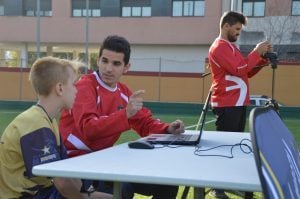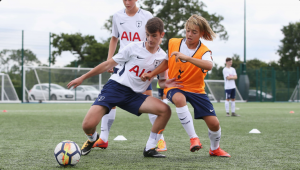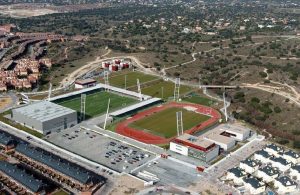 If you are wondering what it takes to become a professional football player, the answer might not be simple. Sheer natural talent and motivation aren’t enough; you need industry contacts, a support team, good insight into your performance, potential, and available opportunities, and almost certainly some luck!
If you are wondering what it takes to become a professional football player, the answer might not be simple. Sheer natural talent and motivation aren’t enough; you need industry contacts, a support team, good insight into your performance, potential, and available opportunities, and almost certainly some luck!
Ertheo’s high-performance football academies provide a high-level, intensive training experience to help you fully understand how to become a professional footballer and give you the edge you need to take that leap.
In a recent Ertheo blog post, we explored the sacrifices needed to play professionally, and in another article, we gave some tips for becoming a professional athlete.
Pursuing a career as a professional athlete requires a lot of hard work, time, money, and talent. And yet there’s still no guarantee you will make it.
The truth is that only the best players can make a living playing football.
Do you know what your chances are?
What Are Your Chances of Becoming a Professional Footballer?
Less than 1% of all children who enter a European football academy at the age of 9 will achieve their dream of becoming a professional footballer (Business Insider UK).
Use our tool below to test your chances of becoming a professional football player:
How to Become a Professional Football Player in Europe
 There is no definitive answer to this question. Every professional athlete has taken their own unique path, and in some countries there are specific requirements for becoming a professional footballer.
There is no definitive answer to this question. Every professional athlete has taken their own unique path, and in some countries there are specific requirements for becoming a professional footballer.
Nevertheless, we will provide you with some general steps to becoming a professional football player in Europe.
How to Become a Professional Football Player in Europe: Step 1 (6 to 11 years)
Typically, a European’s road to becoming a professional footballer starts at their local team, playing in official youth teams, or for professional football clubs. We will discuss youth teams in detail in the following sections.
From an early age, talented football players with great potential tend to participate in football summer camps associated with important football clubs in order to improve their skills, test themselves against other talented youths, and broaden their knowledge of the sport.
How to Become a Professional Football Player in Europe: Step 2 (11 to 15 years)
As players reach their teenage years, they often continue to play for official youth teams, moving up to increasingly better ones as they improve. They begin to play in front of scouts and take part in football tryouts.
From ages 11 to 15, players may continue to play for smaller local youth teams or join larger youth teams at more successful football clubs that offer live-in options. However, official football clubs’ youth teams may not be the best choice for skilled young players.
Those aged 13 to 18 also have the opportunity to join private high-performance football academies which have a greater focus on the individual goals of each player (see section below). Although they are more expensive, these academies are the best and safest choice for young players who have the potential of becoming professional footballers.
Option 1: Live-In – Official Youth Team + Private School
 The most successful football clubs in Europe offer accommodation for their youth teams so that they can welcome players from all over the world. Furthermore, the clubs are associated with private international schools so players can continue with their education while living and training at the club.
The most successful football clubs in Europe offer accommodation for their youth teams so that they can welcome players from all over the world. Furthermore, the clubs are associated with private international schools so players can continue with their education while living and training at the club.
These youth teams are more competitive, with highly-demanding admission tests that require considerable skill. Players up to 9 or 10 years old can go for this option.
Until they are eligible to sign professional football contracts at age 16, players train with the youth team and stay at a residency provided by the football club. They also attend a private international school to continue their education.
Under FIFA regulations, international football players under the age of 15 must be accompanied by their parents, who must travel to the country of destination in order for players to stay at the youth team’s residency.
Very few players achieve the goal of signing a professional football contract at age 16, and sadly, even that is no guarantee of a successful career in professional football. In fact, 5 out of 6 players who sign a professional contract are released before they turn 21.
Option 2: Live-Out – Official Youth Team
Some official European football clubs have youth teams, but do not offer housing nor schooling options for their players.
Since accommodation is not provided, players’ families must live close by. In some cases, families have to move for players to be able to play for one of these youth teams.
These are less competitive teams primarily made up of local players, therefore, although it’s still a long shot, players are more likely to be signed directly into the club’s first team.
That said, a player who makes the first team of a football club that does not offer housing and education is less likely to be successful.
Advice: How to Gain an Advantage over Other Youth Players – Remote UEFA Pro Personal Coach
 Youth team training sessions usually involve about 20 to 25 players and a single coach – two if you’re lucky. This means that the coach’s primary focus is on the team’s overall performance, and they won’t have enough time to provide much individual advice.
Youth team training sessions usually involve about 20 to 25 players and a single coach – two if you’re lucky. This means that the coach’s primary focus is on the team’s overall performance, and they won’t have enough time to provide much individual advice.
Although they will be able to identify how a player’s actions and mistakes may have influenced the final outcome of a match, it is really difficult to provide more comprehensive feedback that includes individual recommendations on how to enhance one’s strengths and improve one’s weaknesses.
A remote coach, on the other hand, can provide personalised advice that will be fundamental to improving your performance. You simply send them the match videos, and they will analyse them in depth, focusing exclusively on your performance on the field. They will then provide a detailed report via email or video call.
For more information, visit Online Football Courses and Remote Training
How to Become a Professional Football Player in Europe: Step 3 (16 to 21 years)
16+ year-old players are eligible to sign professional contracts under FIFA regulations (although some countries have tighter restrictions). There are two reasons football clubs sign professional contracts with players from their youth teams: they believe the player can either make it to the first team or be sold/loaned to another club for a decent amount of money.
Even after signing a professional contract, competition is fierce; 5 out of 6 signed players are released before they turn 21. In other words, less than 17% of players who sign a professional contract end up having a successful career playing football. Despite the overwhelming statistics, players who do not make it are still left heartbroken and without an education to fall back on.
The Issue with Official Football Clubs’ Youth Teams
 Even though playing for youth teams, especially the ones that offer housing and education, can seem like an excellent opportunity for players with great potential, it is important to understand that football clubs act in their own self-interest and pay little attention to the individual success of their players and students.
Even though playing for youth teams, especially the ones that offer housing and education, can seem like an excellent opportunity for players with great potential, it is important to understand that football clubs act in their own self-interest and pay little attention to the individual success of their players and students.
First and foremost, education tends to be of little concern to football clubs. Although in most cases players are required to attend school, their academic performance is usually overlooked. Players are often too exhausted from their training programme to be able to focus on their studies. Football camps simply do not provide the guidance and encouragement needed to perform academically at this age.
What’s more, some European educational systems do not require students to continue their studies after they’ve turned 16. It is extremely common for young players to feel certain that they will make a living as a professional footballer, and so a great number of players choose not to continue their education when they turn 16.
This decision often proves to be a terrible mistake, as only one in six players with a professional contract at the age of 16 actually manage to build a successful career as a professional footballer. When the majority of players have to face the bitter truth – that they won’t be able to make a living playing professional football – they simply do not know where to turn or what to do next.
Moreover, when football clubs release players from their youth teams, they provide little to no guidance regarding their future and available opportunities. Some players may have the chance to play semi-professionally, such as in second-division teams or lower. However, if football clubs do not identify a player’s potential to make them money, they simply will not devote much time exploring other opportunities.
In conclusion, most official football clubs welcome and train a vast number of players in the hope that a select few will make it to the top. Those few who do make it consider official football clubs’ youth teams to be a great opportunity. For the rest, youth teams are brutally competitive, exhausting, and filled with false expectations – especially the ones that offer housing and education.
The Solution to the Youth Teams Issue: High-Performance Football Academies
 Fortunately, players who are serious about becoming professional footballers can join high-performance academies, which provide elite football training as well as first-class education.
Fortunately, players who are serious about becoming professional footballers can join high-performance academies, which provide elite football training as well as first-class education.
Just like with some of the official football clubs’ youth teams, these academies provide students with accommodation. Moreover, unlike football clubs, the academies’ coaching and teaching staff are highly committed to the academic performance of students and encourage them to do well in their studies.
High-performance academies are basically boarding schools with a major focus on professional football training. As opposed to clubs’ youth teams, these academies work with their students’ best interests in mind.
They are not affiliated to any official football club and can therefore assess students’ skills with honesty and provide tailored and constructive advice about their best options in professional football.
Some students simply do not have the skills necessary to build a career in professional football. However, unlike professional football clubs, high-performance academies can match their students with semi-professional teams, so they can still make some money playing football.
High-performance academies always serve the best interests of their students. That’s because while youth teams receive funding from their respective football clubs, high-performance academies receive funding directly from their students.
In other words, football clubs and youth teams seek a return on their investment by signing, loaning, selling, or simply releasing their players without concern for their best interests. On the other hand, the revenue of high-performance academies comes directly from students’ tuition, which is why academy students will always receive completely unbiased advice on their future, both on and off the football pitch.
Only a small percentage makes it to elite professional football, but many other students get to try out for European or international lower-category teams and manage to play at a semi-professional level.
 Students who graduate from high-performance football academies are better equipped. Many decide to continue their education, maybe by getting a scholarship that allows them to study and compete in the USA, or perhaps by studying something related to the world of football, such as sports psychology, physical education, sports science, nutrition, or physiotherapy.
Students who graduate from high-performance football academies are better equipped. Many decide to continue their education, maybe by getting a scholarship that allows them to study and compete in the USA, or perhaps by studying something related to the world of football, such as sports psychology, physical education, sports science, nutrition, or physiotherapy.
Regardless of what they decide for their future, all academy graduates are well informed about their realistic possibilities, as football players as well as in the employment field.
These academies are usually aimed at high school students between the ages of 13 and 18, although there are some options for older students between 18 and 21. The academies’ educational programmes depend largely on the country in which they are located, and can therefore be quite diverse.
If you are considering joining a high-performance academy to increase your chances of becoming a professional football player, you should carefully analyse the options available, because not all academies deliver the quality they promise.
The Issue with High-Performance Football Academies – How to Find the Best Football Academy
At Ertheo, we are expert sports programme consultants and we know most of the academies first-hand. This is why we have created an essential guide to help you discern between the really good academies and the ones that are style over substance.
Things to Consider when Searching for a High-Performance Football Academy
Here are the 10 most important points to consider in order to determine which academy suits you best:
- The academy’s experience
- Amount of enrolled players
- Type of matches/competitions offered
- Affiliate relationship (private academy vs academy affiliated with a football club)
- Player skill level
- Coaching staff skill level
- Training programme
- Support staff
- Additional aspects: education, sports and accommodation facilities, food services, and other staff
- Pricing & scholarship options
We will discuss each of these aspects in detail below. If you want to learn more about this topic, check out our complete guide on how to choose a high-performance academy.
Get to know the academy first-hand
 Before deciding on an academy, we strongly recommend you attend one of their short-term programmes to see it for yourself. When assessing an academy, nothing has more value than spending a couple of days training there.
Before deciding on an academy, we strongly recommend you attend one of their short-term programmes to see it for yourself. When assessing an academy, nothing has more value than spending a couple of days training there.
By participating in a football tryout you will get to learn first-hand all those intangible aspects that are hard to assess remotely, such as the staff, training methods, and intensity level of the training sessions.
Long-term programmes at football academies are not cheap, so a visit to the academy is the safest way to ensure that you are making the best possible investment in your future. Furthermore, academies that offer scholarship options only do so to players who take part in football tryouts, where they can assess players’ skill level as well as their attitude on and off the field.
Having said this, let’s go over the 10 most important points to consider when assessing a high-performance football school.
1 – The Academy’s Experience
Knowing how long an academy has been operating can give you some valuable insight, as long-standing academies are always a good sign because:
- They probably have more students
- They probably work with their own training methodology
- They probably have a useful network of industry contacts to help find opportunities for their most prominent students
Asking about years of experience can help you assess the academy and compare it with other options.
2 – The Academy’s Size
Choosing between a smaller or larger academy is a completely subjective decision. Below, we will describe the main features of both alternatives so you can decide which one suits you best:
Smaller Academies
- May offer more personalised attention
- May be cheaper (less staff)
- Often send their players to local teams because they do not have their own training group
Bigger Academies
- Offer an ideal learning environment to improve student performance because players train, study, and live together
- Generally speaking, they provide less personalised care than smaller academies
- They probably have a larger support staff, including psychologists, physiotherapists, nutritionists, etc.
3 – Matches & Competitions
To improve your football skills, you need to play matches where you can test what you have learned in the training sessions.
Therefore, it is important to know how many matches are played per season, against which teams, whether they are official competitions or friendly matches, etc.
4 – Academy Affiliated with a Football Club vs Independent Academy
The fact that an academy is associated with a well-known professional team does not guarantee its quality. You should ask if players train within the official club categories or if there is any possibility for an academy player to try out at the official club.
Independent academies, on the other hand, are not associated with any football clubs, so they can offer a wider array of opportunities as long as they are experienced enough and have a solid network of industry contacts.
5 – Academy Players Skill Level
This is one of the most important points, as you need to find an academy that matches your skill level (or is slightly higher). To reach your full potential, you need a competitive environment that pushes you beyond your comfort zone. If you train with lower-level players, your learning will stagnate, whereas training with much more advanced players can become frustrating, and you might fall behind.
6 – Coaching Staff Skill Level
The coaching staff is a key piece of the learning process, but assessing them without knowing the academy is no easy feat. Don’t just look at their degrees and bear in mind that at an international academy, coaches must be qualified to train highly diverse groups of students with different languages, cultures, and play styles.
You should also check if the academy works with analysts and relevant technology to track and evaluate your performance.
7 – Training Programme
While the coaching staff is one of the cornerstones of an academy, the training programme is even more significant. Academies that have a proper system in place to train their coaching staff do not rely as much on individual coaches because they ensure all students are taught the same way in a consistent and coherent manner.
8 – Support Staff
It is important to know what kind of professionals work at the academy in addition to the coaching staff. Professionals such as sports psychologists, fitness trainers, nutritionists, and physiotherapists can design a personalised plan to help students improve their performance. Going to a psychologist or nutritionist once a month is different from having their support on a regular basis and being able to ask for assistance whenever you need something.
9 – Additional Aspects
In addition to football-related concerns, there are other fundamental aspects to consider when choosing a high-performance academy.
Here are the most important ones:
 Education: Continuing your academic studies while training is of paramount importance. You should choose a football school that cares about their students’ education and offers an academic programme that meets your needs.
Education: Continuing your academic studies while training is of paramount importance. You should choose a football school that cares about their students’ education and offers an academic programme that meets your needs.- Facilities: The quality of the accommodation and sports facilities are another important thing to bear in mind, as you will spend a long time living and training at the academy. Check if it has quality football pitches, what the bedrooms are like, whether or not they have private bathrooms, if there are recreational areas, and anything else that is important to you.
- Food Service: An athlete’s diet has a direct influence on their performance. Check what type of food is served at the academy and if they offer a varied and balanced menu that suits your preferences and nutritional requirements.
- Other Staff: Check who the supervision team is, what languages they speak, what their qualifications are, and if there is any other staff at the academy, such as doctors and nurses.
10 – Pricing & Scholarships
Now that you have gone through the 9 main aspects to consider when assessing a football academy, it is time to discuss the programmes’ value for money, as more expensive doesn’t always mean better.
The academic plan, the number of staff and their qualifications, and the quality of facilities will be decisive factors when it comes to the final price. However, price is sometimes set based on a positioning marketing strategy regarding direct competition.
As for scholarships, some academies offer discounts on their programmes for sporting or economic reasons (or both). Football academies are always looking for talented players to join their teams, which is why they are willing to lower the price of their programmes. However, in order to qualify for a scholarship, it is essential to attend one of their short-term programmes first so that the technical staff can assess your skill level, potential, and attitude, which is very hard to do remotely.
If you want to learn more about assessing a football academy, remember to check out our guide on how to choose a high-performance academy.
How to Get Into a Football Academy
High-performance football academies only welcome elite players who have the potential to become professional or semi-professional footballers. Therefore, players who wish to access these academies must attend a football tryout so the coaching staff can assess their performance and determine whether or not they are suitable for the academy. These kids football tryouts give coaches a preliminary analysis of each player’s strengths and weaknesses.
There are three different ways to try out before joining a high-performance academy:
- Attending a football summer camp
- Training at the academy for one or more weeks with the full-time students
- Attending a one- to three-day tryout
We wrote a comprehensive article explaining how to try out at a high-performance football academy, including tips on choosing the best option. Click here to read the complete article.
How can Ertheo Help You
Ertheo is a sports and education agency located in the south of Spain with connections to the best high-performance football academies in Europe and the USA.
We know what it takes to become a professional football player and we also work in close collaboration with the most famous football clubs world-wide. In addition, we offer football summer camps in clubs like Real Madrid, Barcelona, Manchester City, Liverpool, AC Milan, Arsenal, Paris Saint Germain, and Chelsea.
You can view our complete list of football summer camps, or you can search by country. We offer programmes in Spain, the United Kingdom, Italy, the United States, and other destinations.
We know every detail about each camp and academy we offer, including the training programme, staff, coaching team, accommodation options, and academic plan. We can help you choose the option that suits you best as you continue your journey to becoming a professional football player.
For more information on any of these programs, or if you need advice on choosing the camp or high-performance academy that best meets your needs, please feel free to contact us.
You can also email us directly at [email protected] or call us at:
SPAIN
Málaga (+34) 951 204 061
Barcelona (+34) 93 018 6626
UNITED KINGDOM
Londres (+44) 203 769 94 43
MORE CONTACT NUMBERS
USA. Boston (+1) 857 208 72 49
FRANCE. Paris (+33) 170 849 040
MÉXICO. Mexico city (+52) 554 160 44 95
SPAIN. Madrid (+34) 902 750 359

